(完整版)最新沪教牛津版九年级下册课文与翻译
最新沪教牛津版九年级下册课文与翻译汇编
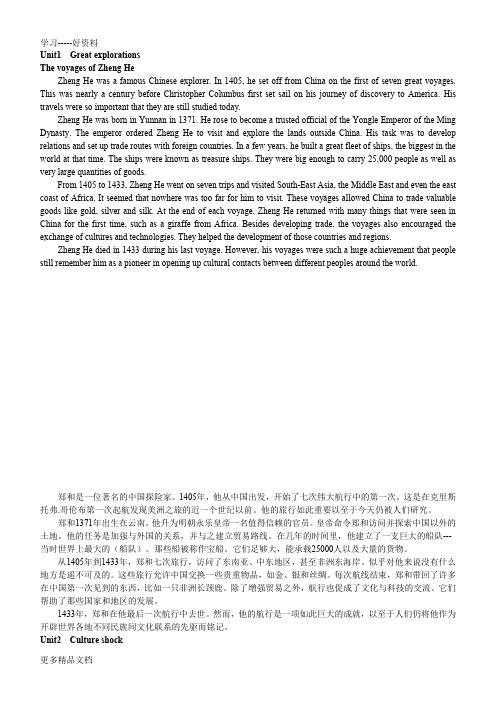
Unit1 Great explorationsThe voyages of Zheng HeZheng He was a famous Chinese explorer. In 1405, he set off from China on the first of seven great voyages. This was nearly a century before Christopher Columbus first set sail on his journey of discovery to America. His travels were so important that they are still studied today.Zheng He was born in Yunnan in 1371. He rose to become a trusted official of the Yongle Emperor of the Ming Dynasty. The emperor ordered Zheng He to visit and explore the lands outside China. His task was to develop relations and set up trade routes with foreign countries. In a few years, he built a great fleet of ships, the biggest in the world at that time. The ships were known as treasure ships. They were big enough to carry 25,000 people as well as very large quantities of goods.From 1405 to 1433, Zheng He went on seven trips and visited South-East Asia, the Middle East and even the east coast of Africa. It seemed that nowhere was too far for him to visit. These voyages allowed China to trade valuable goods like gold, silver and silk. At the end of each voyage, Zheng He returned with many things that were seen in China for the first time, such as a giraffe from Africa. Besides developing trade, the voyages also encouraged the exchange of cultures and technologies. They helped the development of those countries and regions.Zheng He died in 1433 during his last voyage. However, his voyages were such a huge achievement that people still remember him as a pioneer in opening up cultural contacts between different peoples around the world.郑和是一位著名的中国探险家。
牛津上海版九年级下册Unit2lifeinthefuture说课稿
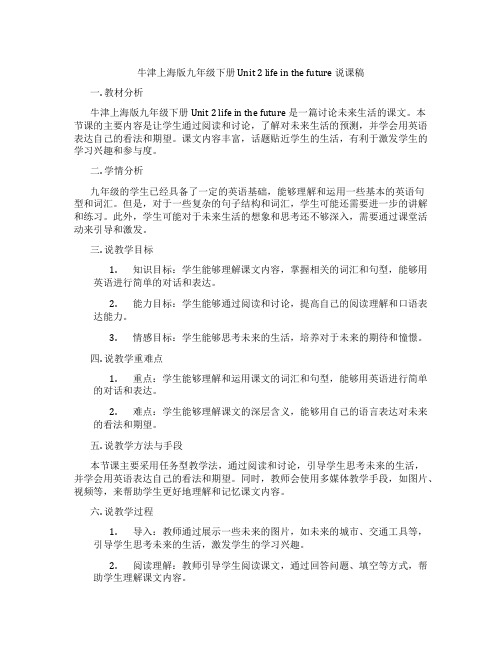
牛津上海版九年级下册 Unit 2 life in the future 说课稿一. 教材分析牛津上海版九年级下册Unit 2 life in the future 是一篇讨论未来生活的课文。
本节课的主要内容是让学生通过阅读和讨论,了解对未来生活的预测,并学会用英语表达自己的看法和期望。
课文内容丰富,话题贴近学生的生活,有利于激发学生的学习兴趣和参与度。
二. 学情分析九年级的学生已经具备了一定的英语基础,能够理解和运用一些基本的英语句型和词汇。
但是,对于一些复杂的句子结构和词汇,学生可能还需要进一步的讲解和练习。
此外,学生可能对于未来生活的想象和思考还不够深入,需要通过课堂活动来引导和激发。
三. 说教学目标1.知识目标:学生能够理解课文内容,掌握相关的词汇和句型,能够用英语进行简单的对话和表达。
2.能力目标:学生能够通过阅读和讨论,提高自己的阅读理解和口语表达能力。
3.情感目标:学生能够思考未来的生活,培养对于未来的期待和憧憬。
四. 说教学重难点1.重点:学生能够理解和运用课文的词汇和句型,能够用英语进行简单的对话和表达。
2.难点:学生能够理解课文的深层含义,能够用自己的语言表达对未来的看法和期望。
五. 说教学方法与手段本节课主要采用任务型教学法,通过阅读和讨论,引导学生思考未来的生活,并学会用英语表达自己的看法和期望。
同时,教师会使用多媒体教学手段,如图片、视频等,来帮助学生更好地理解和记忆课文内容。
六. 说教学过程1.导入:教师通过展示一些未来的图片,如未来的城市、交通工具等,引导学生思考未来的生活,激发学生的学习兴趣。
2.阅读理解:教师引导学生阅读课文,通过回答问题、填空等方式,帮助学生理解课文内容。
3.口语表达:教师学生进行小组讨论,让学生用自己的语言表达对未来的看法和期望。
4.写作练习:教师让学生写一篇关于未来生活的短文,让学生能够综合运用所学的词汇和句型。
5.总结:教师对学生的表现进行评价,对课文内容进行总结,引导学生思考未来的生活。
沪教牛津版初中英语九年级下册课文(电脑手机通用版)

中国以外的土地,他的任务是发展关系,
and set up trade routes with foreign countries.
建立与国外贸易通道。
In a few years, he built a great fleet of ships,
He traded valuable goods like gold, silver and silk.
他用贵重商品,如黄金、白银和丝绸做贸易。
Doris: Sorry, I didn't quite catch you.
Doris:对不起,我没听清,
You said he traded gold, silver and…?
In 1271, when he was 17 years old,
1271 年,当他 17 岁的时候,
英中全
he set off on a journey to Asia with his father and uncle,
他跟随他的父亲和叔叔开始了他的亚洲旅程,
and did not return home until 24 years later.
你说他买卖黄金、白银和……?
英中全
Tony: Silk. Once he even brought back a giraffe!
Tony:丝绸,有一次,他甚至带回来一只长颈鹿!
Unit1 More practice
Marco Polo
马可·波罗
By West Lake, in the city of Hangzhou, there is a mall
深圳牛津版最新九年级初三(下 课文 (带翻译

初三(下)课文(翻译)1—3Unit 1 课文(翻译)Great explorations[ekspl?'re??(?)n]探索郑和下西洋每次航次结束,郑和返回时都带回在中国从没见过的很多东西,譬如来自非洲的长颈鹿。
除了发展贸易,航行也带动了文化和技术的交流,帮助了这些国家和地区的发展。
At the end of each voyage, Zheng He returned with many things that were seen in China for the first time, such as a giraffe[d??'rɑ:f]长颈鹿 from Africa['?fr?k?]非洲. Besides[b?'sa?dz]除了 developing trade发展贸易, the voyages also encouraged[?n'k?r?d?; en-]鼓励 the exchange[?ks't?end?]交换 of cultures['k?lt??]文化 and technologies[tek'n?l?d??]技术. They helped the development[d?'vel?pm(?)nt]发展 of thosecountries and regions['ri?d?(?)n]地区.1433 年,郑和在他最后一次航行中去世了。
然而,他的航行成就是如此巨大,人们仍然铭记他,视他为开拓世界各地不同民族之间文化交流的先驱。
Zheng He died in 1433 during his last voyage['v???d?]航行. However, his voyages were such a huge achievement [?'t?i?vm(?)nt]成就that people still remember him as a pioneer[pa??'n??]先锋 in opening up开创cultural ['k?lt?(?)r(?)l] 文化的contacts['k?nt?kt]接触;联系 between different peoples around练习 it in错过the History lesson today. Can you tell me what you learnt, please?当然可以,我们学了郑和他的航行。
沪教牛津版九年级下册课文与翻译
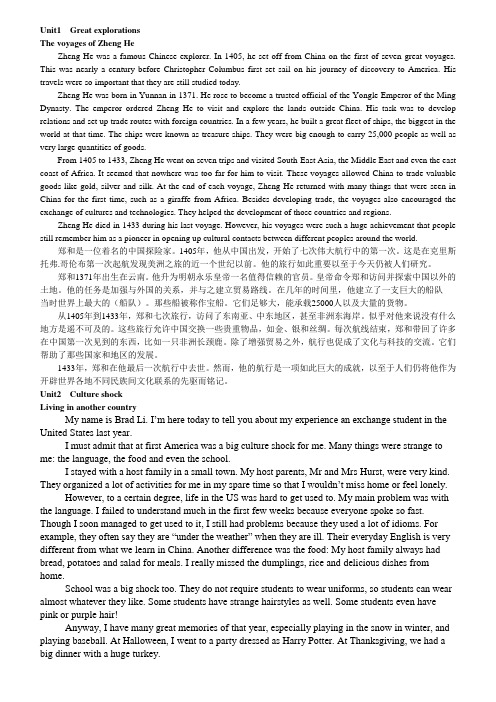
Unit1 Great explorationsThe voyages of Zheng HeZheng He was a famous Chinese explorer. In 1405, he set off from China on the first of seven great voyages. This was nearly a century before Christopher Columbus first set sail on his journey of discovery to America. His travels were so important that they are still studied today.Zheng He was born in Yunnan in 1371. He rose to become a trusted official of the Yongle Emperor of the Ming Dynasty. The emperor ordered Zheng He to visit and explore the lands outside China. His task was to develop relations and set up trade routes with foreign countries. In a few years, he built a great fleet of ships, the biggest in the world at that time. The ships were known as treasure ships. They were big enough to carry 25,000 people as well as very large quantities of goods.From 1405 to 1433, Zheng He went on seven trips and visited South-East Asia, the Middle East and even the east coast of Africa. It seemed that nowhere was too far for him to visit. These voyages allowed China to trade valuable goods like gold, silver and silk. At the end of each voyage, Zheng He returned with many things that were seen in China for the first time, such as a giraffe from Africa. Besides developing trade, the voyages also encouraged the exchange of cultures and technologies. They helped the development of those countries and regions.Zheng He died in 1433 during his last voyage. However, his voyages were such a huge achievement that people still remember him as a pioneer in opening up cultural contacts between different peoples around the world.郑和是一位着名的中国探险家。
沪教牛津版初中英语九年级下册Unit 1知识点梳理

沪教牛津版初中英语九年级下册Unit 1知识点梳理Unit1 单词voyage ['vɔɪɪdʒ] 航行n.repetition [repɪ'tɪʃ(ə)n] 重复n.American [əmerɪkən] 美洲的adjcontinent ['kɒntɪnənt] 大陆n.*route [ruːt] 路线n.discovery [dɪ'skʌv(ə)rɪ] 发现n.rise [raɪz] (rose,risen) 变得更加成功或重要、强大v.official [ə'fɪʃ(ə)l] 官员ndevelop [dɪ'veləp] 增强;加强v.relation [rɪ'leɪʃ(ə)n] 关系;交往n.trade [treɪd] 贸易v. 以物易物;互相交换n.foreign ['fɒrɪn] 外国的adj.*fleet [fliːt] (统一调度的)船队;机群n.Africa ['æfrɪkə] 非洲n.nowhere ['nəʊhweə] 无处;哪里都不adv.silk [sɪlk] 丝织物;丝绸n.giraffe [dʒə'rɑ:f] 长颈鹿n.besides [bɪ'saɪdz] 除……之外(还)prep.development [dɪ'veləpm(ə)nt] 发展;壮大n.*region ['riːdʒ(ə)n] 地区n.pioneer [paɪə'nɪə] 先锋;先驱n.people ['piːp(ə)l] 民族;种族n.wealth [welθ] 财富n.spread [spred] (spread,spread) 传播v.open up 开辟go on a trip 去旅行set up 建立;设立set sail 起航(be) known as 被称为as well as 也;还lead to 导致compare ... with ... 把……与……对比Unit1 课文The voyages of Zheng He郑和下西洋Zheng He was a famous Chinese explorer. In 1405, he set off from China on the first of seven great voyages. This was nearly a century before Christopher Columbus first set sail on his journey of discovery to America. His travels were so important that they are still studied today. 郑和是中国著名的探险家。
沪教牛津版九年级下册英语教材
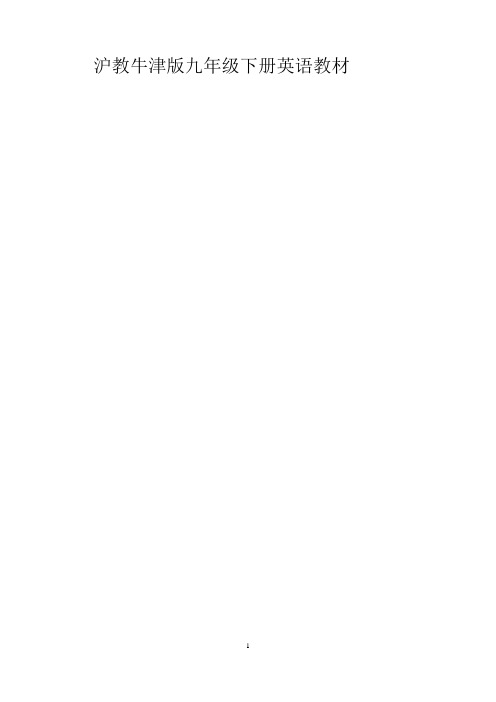
沪教牛津版九年级下册英语教材Unit1Great exploration ➢单词➢重点短语open up 开辟Hand in 上交go on a trip 去旅行look for 寻找set up 建立;设立Around the world 世界各地set sail 起航such as 例如(be) known as 被称为At the end of 在......末端as well as 也;还Not ...until 直到......才......lead to 导致Because of 因为,由于compare…with…把……与……对比between ...and...在......和......之间➢重点句型1. They were big enough to carry 25,000 people as well as very large quantities of goods.它们足够大,能携带25000 人以及大量的货物。
2. At the end of each voyage, Zheng He returned with many things that were seen in China for the first time, such as a giraffe from Africa.在每次航行结束,郑和带回了许多在中国第一次见到的东西,比如一只非洲长颈鹿。
3. It has become one of the biggest companies in the country.它已经成为了这个国家最大的公司之一。
➢课文翻译Unit1 Reading (书本P3)The voyages of Zheng He郑和下西洋Zheng He was a famous Chinese explorer. In 1405, he set off from China on the first of seven great voyages.郑和是中国著名的探险家。
深圳牛津版最新九年级(下)-课文-(带翻译)-word文档

初三(下)课文(翻译)1—3Unit 1 课文(翻译)Great explorations[eksplə'reɪʃ(ə)n]探索郑和下西洋The voyages ['vɒɪɪdʒ] 航行of Zheng He郑和是中国著名的探险家。
1405,他发起了中国七大航海史上的第一次。
这比哥伦布第一次航行发现美洲新大陆早了近一个世纪。
他的旅行是如此重要,人们至今仍然研究。
Zheng He was a famous Chinese explorer. In 1404, he set off出发from China on the first of seven great voyages ['vɒɪɪdʒ] 航行. This was nearly['nɪəlɪ]差不多a century ['sentʃʊrɪ]世纪before Christopher['krɪstəfə(r)] Columbus[kə'lʌmbəs] first set sail启航on his journey['dʒɜːnɪ]旅途 of discovery[dɪ'skʌv(ə)rɪ]发现 to America. His travels were so important that they are still studied today.郑和 1371 出生于云南,后来成为明朝永乐皇帝可信任的官员。
皇帝下令郑造访并探索中国以外的土地,他的任务是发展关系,建立与国外贸易通道。
Zheng He was born in Yunnan in 1371. He rose to 升迁;上升到become a trusted受信任的official [ə'fɪʃ(ə)l]官员of the Yongle Emperor['emp(ə)rə]皇帝of the Ming Dynasty['daɪnəsti]朝代. The emperor ordered Zheng He to visit and explore[ɪk'splɔː; ek-]探索the lands outside China. His task[tɑːsk]任务was to develop relations[dɪ'veləp]发展关系 and set up建立trade[treɪd]贸易 routes[ruːt]路线;航线with foreign countries.在短短几年内,他建造船舶组成了一支庞大的舰队,是当时世界上最大的。
沪教牛津版初中英语九年级下册Unit 2知识点梳理

沪教牛津版初中英语九年级下册Unit 2知识点梳理Unit2单词culture shock ['kʌltʃə] [ʃɒk] 文化冲击;文化休克camp [kæmp] 度假营*firework ['faɪəwɜːk] 烟火;烟花*turkey ['tɜːkɪ] 火鸡international [ɪntə'næʃ(ə)n(ə)l] 国际的admit [əd'mɪt] (常指勉强)承认spare [speə] 空闲的;空余的degree [dɪ'griː] 程度fail [feɪl] 失败;未能(做到)manage ['mænɪdʒ] 完成(困难的事);勉力完成人生在勤,不索何获idiom ['ɪdɪəm] 习语;惯用语everyday ['evrɪdeɪ; -'deɪ] 每天的;日常的uniform ['juːnɪfɔːm] 校服whatever [wɒt'evə] 任何事物;一切事物pink [pɪŋk] 粉红色的purple ['pɜːp(ə)l] 紫色的anyway ['enɪweɪ] 无论如何;反正especially [ɪ'speʃ(ə)lɪ; e-] 尤其;特别baseball ['beɪsbɔːl] 棒球运动education [edjʊ'keɪʃ(ə)n] 有教益的经历state [steɪt] 州,国家national ['næʃ(ə)n(ə)l] 国家的;民族的;全国的president ['prezɪd(ə)nt] 总统vacation [vəˈkeɪʃn; veɪ-] 假期schedule [ˈʃɛdjuːl] 日程安排set off 使(炸弹等)爆炸take off 脱下in one's spare time 在某人的空闲时间里to a certain degree 在某种程度上get used to 习惯于;适应under the weather 略有不适;不得劲Unit2课文Culture shock文化冲击Brad Li is a junior high school student in China. He visited the US on an international exchange last year, and now he is giving a speech about his experience.布兰德·李是中国一所初中的学生。
深圳沪教版初中英语九年级下课文+知识点
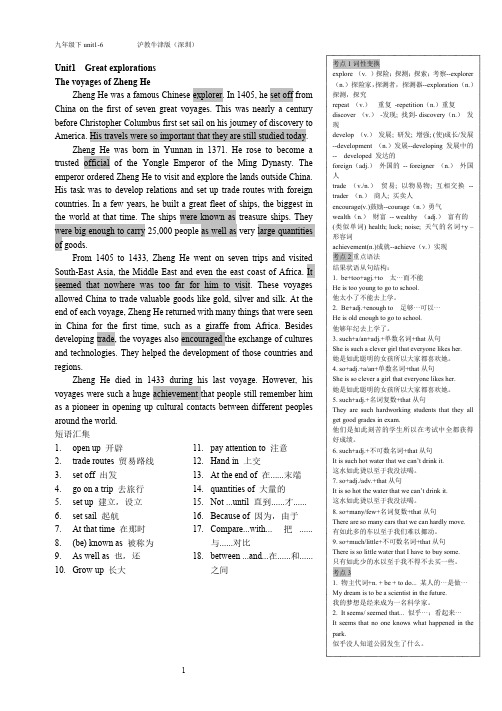
Unit1Great explorationsThe voyages of Zheng HeZheng He was a famous Chinese explorer.In1405,he set off from China on the first of seven great voyages.This was nearly a century before Christopher Columbus first set sail on his journey of discovery to America.His travels were so important that they are still studied today.Zheng He was born in Yunnan in1371.He rose to become a trusted official of the Yongle Emperor of the Ming Dynasty.The emperor ordered Zheng He to visit and explore the lands outside China. His task was to develop relations and set up trade routes with foreign countries.In a few years,he built a great fleet of ships,the biggest in the world at that time.The ships were known as treasure ships.They were big enough to carry25,000people as well as very large quantities of goods.From1405to1433,Zheng He went on seven trips and visited South-East Asia,the Middle East and even the east coast of Africa.It seemed that nowhere was too far for him to visit.These voyages allowed China to trade valuable goods like gold,silver and silk.At the end of each voyage,Zheng He returned with many things that were seen in China for the first time,such as a giraffe from Africa.Besides developing trade,the voyages also encouraged the exchange of cultures and technologies.They helped the development of those countries and regions.Zheng He died in1433during his last voyage.However,his voyages were such a huge achievement that people still remember him as a pioneer in opening up cultural contacts between different peoples around the world.短语汇集1.open up开辟2.trade routes贸易路线3.set off出发4.go on a trip去旅行5.set up建立,设立6.set sail起航7.At that time在那时8.(be)known as被称为9.As well as也,还10.Grow up长大11.pay attention to注意12.Hand in上交13.At the end of在......末端14.quantities of大量的15.Not...until直到......才......16.Because of因为,由于pare...with...把......与......对比18.between...and...在......和......之间考点1词性变换explore(v.)探险;探测;探索;考察--explorer(n.)探险家,探测者,探测器--exploration(n.)探测,探究repeat(v.)重复-repetition(n.)重复discover(v.)-发现;找到-discovery(n.)发现develop(v.)发展;研发;增强;(使)成长/发展--development(n.)发展--developing发展中的--developed发达的foreign(adj.)外国的--foreigner(n.)外国人trade(v./n.)贸易;以物易物;互相交换--trader(n.)商人;买卖人encourage(v.)鼓励--courage(n.)勇气wealth(n.)财富--wealthy(adj.)富有的(类似单词)health;luck;noise;天气的名词+y–形容词achievement(n.)成就--achieve(v.)实现考点2重点语法结果状语从句结构:1.be+too+agj.+to太···而不能He is too young to go to school.他太小了不能去上学。
深圳牛津版最新九年级(下) 课文 (带翻译)

初三(下)课文(翻译)1—3Unit 1 课文(翻译)Great explorations[eksplə'reɪʃ(ə)n]探索郑和下西洋The voyages ['vɒɪɪdʒ] 航行of Zheng He郑和是中国著名的探险家。
1405,他发起了中国七大航海史上的第一次。
这比哥伦布第一次航行发现美洲新大陆早了近一个世纪。
他的旅行是如此重要,人们至今仍然研究。
Zheng He was a famous Chinese explorer. In 1404, he set off 出发from China on the first of seven great voyages ['vɒɪɪdʒ] 航行. This was nearly['nɪəlɪ]差不多 a century ['sentʃʊrɪ] 世纪before Christopher['krɪstəfə(r)] Columbus[kə'lʌmbəs] first set sail启航 on his journey['dʒɜːnɪ]旅途 of discovery[dɪ'skʌv(ə)rɪ]发现to America. His travels were so important that they are still studied today.郑和 1371 出生于云南,后来成为明朝永乐皇帝可信任的官员。
皇帝下令郑造访并探索中国以外的土地,他的任务是发展关系,建立与国外贸易通道。
Zheng He was born in Yunnan in 1371. He rose to 升迁;上升到bee a trusted受信任的official [ə'fɪʃ(ə)l]官员of the Yongle Emperor['emp(ə)rə]皇帝 of the Ming Dynasty['daɪnəsti]朝代. The emperor ordered Zheng He to visit and explore[ɪk'splɔː; ek-]探索the lands outside China. His task[tɑːsk]任务was to develop relations[dɪ'veləp]发展关系and set up建立trade[treɪd]贸易routes[ruːt]路线;航线 with foreign countries.在短短几年内,他建造船舶组成了一支庞大的舰队,是当时世界上最大的。
深圳牛津版最新新九年级(下)课文(带翻译)

艿初三(下)芃课文(翻译)蚃1—3芈Unit 1 课文(翻译)莈Great explorations[ekspl?'re??(?)n]探索蚄郑和下西洋肁The voyages ['v???d?] 航行of Zheng He莁郑和是中国著名的探险家。
1405,他发起了中国七大航海史上的第一次。
这比哥伦布第一次航行发现美洲新大陆早了近一个世纪。
他的旅行是如此重要,人们至今仍然研究。
蒈Zheng He was a famous Chinese explorer. In 1404, he set off出发from China on the first of seven great voyages ['v???d?] 航行. This was nearly['n??l?]差不多 a century ['sent??r?]世纪before Christopher['kr?st?f?(r)] Columbus[k?'l?mb?s] first set sail启航on his journey['d???n?]旅途 of discovery[d?'sk?v(?)r?]发现 to America. His travels were so important that they are still studied today.肅郑和1371 出生于云南,后来成为明朝永乐皇帝可信任的官员。
皇帝下令郑造访并探索中国以外的土地,他的任务是发展关系,建立与国外贸易通道。
袃Zheng He was born in Yunnan in 1371. He rose to 升迁;上升到become a trusted 受信任的official [?'f??(?)l]官员 of the Yongle Emperor['emp(?)r?]皇帝 of the Ming Dynasty['da?n?sti]朝代. The emperor ordered Zheng He to visit and explore[?k'spl??; ek-]探索the lands outside China. His task[tɑ?sk]任务was to develop relations[d?'vel?p]发展关系 and set up建立trade[tre?d]贸易 routes[ru?t]路线;航线with foreign countries.肀在短短几年内,他建造船舶组成了一支庞大的舰队,是当时世界上最大的。
牛津沪教版英语九年级下册课文翻译

牛津沪教版英语九年级下册课文翻译1. 九年级上海版(牛津版)英语翻译Kindly Step into the Vat--Try What You Have Devised against Others In order to suppress those who were against her, Wu Zetian, the empress of the Tang Dynasty (618-907), appointed a few merciless persons to be judges. Two of them were extremely brutal; one was called Zhou Xing and the other was called Lai Junchen. They killed many upright civil and military officials as well as ordinary people by framing up cases against them and by administering inhuman corporal punishment to them. Once, Wu Zetian received a letter which informed against Zhou Xing. The letter aside that Zhou Xing was plotting a rebellion in collaboration with others. Wu Zetian was furiously angry when she read the letter, and immediately ordered Lai Junchen to deal with the case severely. Hearing the order, Lai Junchen had misgivings about it. He knew that Zhou Xing could not be forced to tell the truth merely by using a letter informing against him because he was very sly and crafty. Lai Junchen also knew that he would not be for given if he should fail in dealing with the case, because the empress would certainly blame him and punish him. How could he solve the problem then? He turned the problem over and over in his mind, and finally thought out a "brilliant scheme". Lai Junchen had a sumptuous feast prepared, and invited Zhou Xing to his home. The two of them urged each other to drink, and they talked while drinking. After the wine had gone round three times, Lai Junchen pretended to sigh, "When Ihandle cases in ordinary times, I often come across prisoners who stubbournly refuse to admit they are guilty. I wonder if you have any effetive measures." Hearing this, he took a sip of the wine.Lai Junchen immediately pretended to be very earnest, saying, "Oh, please do tell me at once." Smiling insidiously, Zhou Xing said, "Get a big vat, scorch it hot with charcoal fire all around, and then let the prisoner come into the vat. Will the prisoner fail to make a confession of his crime?" Hearing this. LaiJunchen nodded his head in approval repeatedly. He then ordered his subordinates to bring a big vat, and had a charcoal fire lit all around it as Zhou Xing had said. He then turned to Zhou Xing and said, "Someone in the imperial court has informed against you, saying that you are plotting a rebellion. The empress has ordered me to deal with the case severely. So I beg your pardon, but would you kindly step into the vat?" Hearing this, Zhou Xing dropped his wine cup to the ground and the cup broke with a crash. Then he knelt down with a flop, nodded repeatedly and said, "I am guilty. I confess I am guilty." This story appears in A General History as a Mirror of Past Events by Sima Guang of the Song Dynasty. From this story, people have derived the set phrase "kindly step into the vat -- try what you have devised against others".。
(word完整版)最新沪教牛津版九年级下册课文与翻译
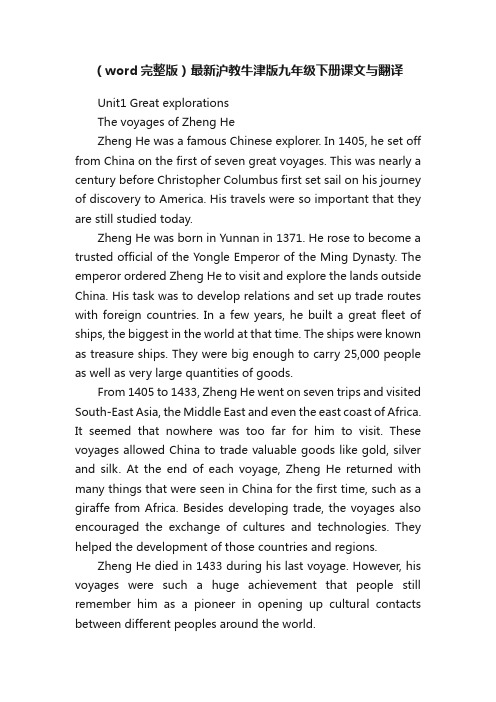
(word完整版)最新沪教牛津版九年级下册课文与翻译Unit1 Great explorationsThe voyages of Zheng HeZheng He was a famous Chinese explorer. In 1405, he set off from China on the first of seven great voyages. This was nearly a century before Christopher Columbus first set sail on his journey of discovery to America. His travels were so important that they are still studied today.Zheng He was born in Yunnan in 1371. He rose to become a trusted official of the Yongle Emperor of the Ming Dynasty. The emperor ordered Zheng He to visit and explore the lands outside China. His task was to develop relations and set up trade routes with foreign countries. In a few years, he built a great fleet of ships, the biggest in the world at that time. The ships were known as treasure ships. They were big enough to carry 25,000 people as well as very large quantities of goods.From 1405 to 1433, Zheng He went on seven trips and visited South-East Asia, the Middle East and even the east coast of Africa. It seemed that nowhere was too far for him to visit. These voyages allowed China to trade valuable goods like gold, silver and silk. At the end of each voyage, Zheng He returned with many things that were seen in China for the first time, such as a giraffe from Africa. Besides developing trade, the voyages also encouraged the exchange of cultures and technologies. They helped the development of those countries and regions.Zheng He died in 1433 during his last voyage. However, his voyages were such a huge achievement that people still remember him as a pioneer in opening up cultural contacts between different peoples around the world.郑和是一位著名的中国探险家。
上海沪教版牛津英语书九年级下
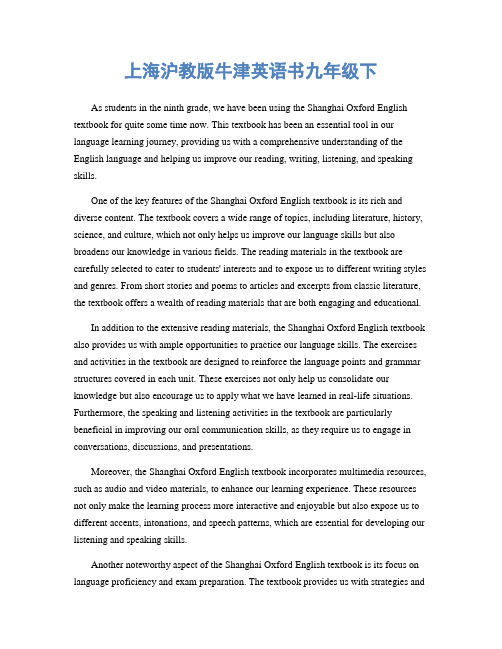
上海沪教版牛津英语书九年级下As students in the ninth grade, we have been using the Shanghai Oxford English textbook for quite some time now. This textbook has been an essential tool in our language learning journey, providing us with a comprehensive understanding of the English language and helping us improve our reading, writing, listening, and speaking skills.One of the key features of the Shanghai Oxford English textbook is its rich and diverse content. The textbook covers a wide range of topics, including literature, history, science, and culture, which not only helps us improve our language skills but also broadens our knowledge in various fields. The reading materials in the textbook are carefully selected to cater to students' interests and to expose us to different writing styles and genres. From short stories and poems to articles and excerpts from classic literature, the textbook offers a wealth of reading materials that are both engaging and educational.In addition to the extensive reading materials, the Shanghai Oxford English textbook also provides us with ample opportunities to practice our language skills. The exercises and activities in the textbook are designed to reinforce the language points and grammar structures covered in each unit. These exercises not only help us consolidate our knowledge but also encourage us to apply what we have learned in real-life situations. Furthermore, the speaking and listening activities in the textbook are particularly beneficial in improving our oral communication skills, as they require us to engage in conversations, discussions, and presentations.Moreover, the Shanghai Oxford English textbook incorporates multimedia resources, such as audio and video materials, to enhance our learning experience. These resources not only make the learning process more interactive and enjoyable but also expose us to different accents, intonations, and speech patterns, which are essential for developing our listening and speaking skills.Another noteworthy aspect of the Shanghai Oxford English textbook is its focus on language proficiency and exam preparation. The textbook provides us with strategies andtips for tackling various language tasks and exam questions, which are invaluable for our academic success. Additionally, the practice tests and mock exams in the textbook help us familiarize ourselves with the format and style of English exams, thereby boosting our confidence and performance in actual assessments.Furthermore, the Shanghai Oxford English textbook places a strong emphasis on cultural awareness and global perspectives. Through the reading materials and activities, we are exposed to different cultures, traditions, and societal issues, which not only enrich our understanding of the world but also foster our empathy and open-mindedness.In conclusion, the Shanghai Oxford English textbook for ninth graders is a comprehensive and invaluable resource that has greatly contributed to our language learning and personal development. Its rich content, diverse materials, interactive resources, and exam-focused approach have equipped us with the necessary skills and knowledge to excel in English and beyond. We are grateful for the opportunities and experiences that this textbook has provided us and look forward to continuing our language learning journey with its guidance.。
沪教牛津版九年级下知识点
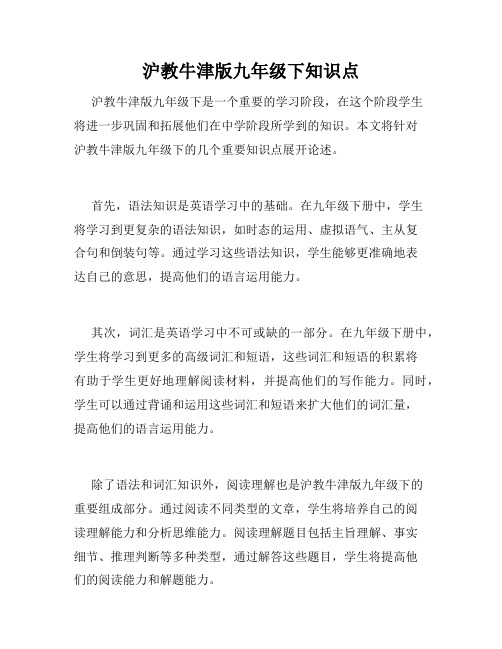
沪教牛津版九年级下知识点沪教牛津版九年级下是一个重要的学习阶段,在这个阶段学生将进一步巩固和拓展他们在中学阶段所学到的知识。
本文将针对沪教牛津版九年级下的几个重要知识点展开论述。
首先,语法知识是英语学习中的基础。
在九年级下册中,学生将学习到更复杂的语法知识,如时态的运用、虚拟语气、主从复合句和倒装句等。
通过学习这些语法知识,学生能够更准确地表达自己的意思,提高他们的语言运用能力。
其次,词汇是英语学习中不可或缺的一部分。
在九年级下册中,学生将学习到更多的高级词汇和短语,这些词汇和短语的积累将有助于学生更好地理解阅读材料,并提高他们的写作能力。
同时,学生可以通过背诵和运用这些词汇和短语来扩大他们的词汇量,提高他们的语言运用能力。
除了语法和词汇知识外,阅读理解也是沪教牛津版九年级下的重要组成部分。
通过阅读不同类型的文章,学生将培养自己的阅读理解能力和分析思维能力。
阅读理解题目包括主旨理解、事实细节、推理判断等多种类型,通过解答这些题目,学生将提高他们的阅读能力和解题能力。
此外,九年级下册还包括听力和口语的练习。
通过听力训练,学生将提高他们的听力理解能力和跟读能力。
通过口语练习,学生将锻炼他们的口头表达能力和语音语调。
最后,写作是英语学习中的重要环节。
在九年级下册中,学生将学习到更多的写作技巧和写作模板。
他们将练习写不同类型的作文,如记叙文、说明文、议论文等。
通过写作的练习,学生将提高他们的写作能力和思维能力,同时也提高他们的语法和词汇运用能力。
总之,沪教牛津版九年级下是一个重要的学习阶段,学生将学习到更多的语法知识和词汇,培养他们的阅读理解能力和口语表达能力,提高他们的写作能力。
通过系统和全面的学习,学生将为高中英语学习打下坚实的基础。
深圳牛津版九年级(下) 课文 (带翻译)
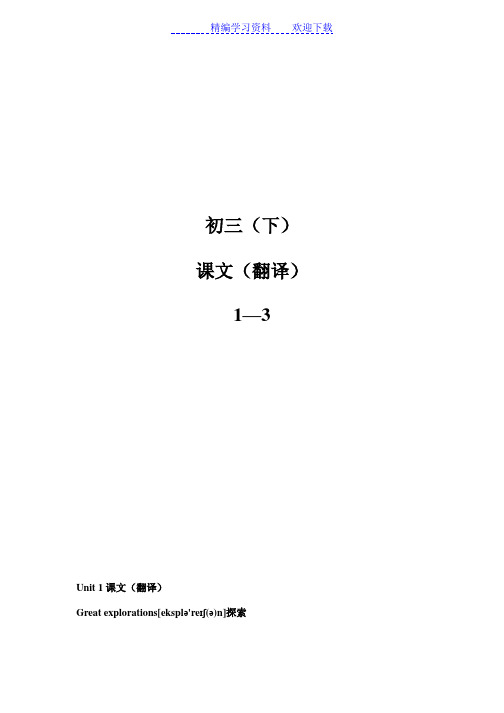
初三(下)课文(翻译)1—3Unit 1 课文(翻译)Great explorations[eksplə'reɪʃ(ə)n]探索郑和下西洋The voyages ['vɒɪɪdʒ] 航行of Zheng He郑和是中国著名的探险家。
1405,他发起了中国七大航海史上的第一次。
这比哥伦布第一次航行发现美洲新大陆早了近一个世纪。
他的旅行是如此重要,人们至今仍然研究。
Zheng He was a famous Chinese explorer. In 1404, he set off出发from China on the first of seven great voyages ['vɒɪɪdʒ] 航行. This was nearly['nɪəlɪ]差不多a century ['sentʃʊrɪ]世纪before Christopher['krɪstəfə(r)] Columbus[kə'lʌmbəs] first set sail启航on his journey['dʒɜːnɪ]旅途 of discovery[dɪ'skʌv(ə)rɪ]发现 to America. His travels were so important that they are still studied today.郑和 1371 出生于云南,后来成为明朝永乐皇帝可信任的官员。
皇帝下令郑造访并探索中国以外的土地,他的任务是发展关系,建立与国外贸易通道。
Zheng He was born in Yunnan in 1371. He rose to 升迁;上升到become a trusted受信任的official [ə'fɪʃ(ə)l]官员of the Yongle Emperor['emp(ə)rə]皇帝of the Ming Dynasty['daɪnəsti]朝代. The emperor ordered Zheng He to visit and explore[ɪk'splɔː; ek-]探索the lands outside China. His task[tɑːsk]任务was to develop relations[dɪ'veləp]发展关系 and set up建立trade[treɪd]贸易 routes[ruːt]路线;航线with foreign countries.在短短几年内,他建造船舶组成了一支庞大的舰队,是当时世界上最大的。
- 1、下载文档前请自行甄别文档内容的完整性,平台不提供额外的编辑、内容补充、找答案等附加服务。
- 2、"仅部分预览"的文档,不可在线预览部分如存在完整性等问题,可反馈申请退款(可完整预览的文档不适用该条件!)。
- 3、如文档侵犯您的权益,请联系客服反馈,我们会尽快为您处理(人工客服工作时间:9:00-18:30)。
Unit1 Great explorationsThe voyages of Zheng HeZheng He was a famous Chinese explorer. In 1405, he set off from China on the first of seven great voyages. This was nearly a century before Christopher Columbus first set sail on his journey of discovery to America. His travels were so important that they are still studied today.Zheng He was born in Yunnan in 1371. He rose to become a trusted official of the Yongle Emperor of the Ming Dynasty. The emperor ordered Zheng He to visit and explore the lands outside China. His task was to develop relations and set up trade routes with foreign countries. In a few years, he built a great fleet of ships, the biggest in the world at that time. The ships were known as treasure ships. They were big enough to carry 25,000 people as well as very large quantities of goods.From 1405 to 1433, Zheng He went on seven trips and visited South-East Asia, the Middle East and even the east coast of Africa. It seemed that nowhere was too far for him to visit. These voyages allowed China to trade valuable goods like gold, silver and silk. At the end of each voyage, Zheng He returned with many things that were seen in China for the first time, such as a giraffe from Africa. Besides developing trade, the voyages also encouraged the exchange of cultures and technologies. They helped the development of those countries and regions.Zheng He died in 1433 during his last voyage. However, his voyages were such a huge achievement that people still remember him as a pioneer in opening up cultural contacts between different peoples around the world.郑和是一位著名的中国探险家。
1405年,他从中国出发,开始了七次伟大航行中的第一次。
这是在克里斯托弗.哥伦布第一次起航发现美洲之旅的近一个世纪以前。
他的旅行如此重要以至于今天仍被人们研究。
郑和1371年出生在云南。
他升为明朝永乐皇帝一名值得信赖的官员。
皇帝命令郑和访问并探索中国以外的土地。
他的任务是加强与外国的关系,并与之建立贸易路线。
在几年的时间里,他建立了一支巨大的船队---当时世界上最大的(船队)。
那些船被称作宝船。
它们足够大,能承载25000人以及大量的货物。
从1405年到1433年,郑和七次旅行,访问了东南亚、中东地区,甚至非洲东海岸。
似乎对他来说没有什么地方是遥不可及的。
这些旅行允许中国交换一些贵重物品,如金、银和丝绸。
每次航线结束,郑和带回了许多在中国第一次见到的东西,比如一只非洲长颈鹿。
除了增强贸易之外,航行也促成了文化与科技的交流。
它们帮助了那些国家和地区的发展。
1433年,郑和在他最后一次航行中去世。
然而,他的航行是一项如此巨大的成就,以至于人们仍将他作为开辟世界各地不同民族间文化联系的先驱而铭记。
Unit2 Culture shockLiving in another countryMy name is Brad Li. I’m here today to tell you about my experience an exchange student in the Unit ed States last year.I must admit that at first America was a big culture shock for me. Many things were strange to me: the language, the food and even the school.I stayed with a host family in a small town. My host parents, Mr and Mrs Hurst, were very kind. They organizeda lot of activities for me in my spare time so t hat I wouldn’t miss home or feel lonely.However, to a certain degree, life in the US was hard to get used to. My main problem was with the language. I failed to understand much in the first few weeks because everyone spoke so fast. Though I soon managed to get used to it, I still had problems because they used a lot of idioms. For example, they often say they are “under the weather” when they are ill. Their everyday English is very different from what we learn in China. Another difference was the food: My host family always had bread, potatoes and salad for meals. I really missed the dumplings, rice and delicious dishes from home.School was a big shock too. They do not require students to wear uniforms, so students can wear almost whatever they like. Some students have strange hairstyles as well. Some students even have pink or purple hair!Anyway, I have many great memories of that year, especially playing in the snow in winter, and playing baseball. At Halloween, I went to a party dressed as Harry Potter. At Thanksgiving, we had a big dinner with a huge turkey.It was an exciting year, and it was a valuable education for me. Now I understand more about American culture. My American friends asked me many questions about life in China, and this made me think about my own culture as well.在另一个国家生活我的名字叫布拉德.李。
今天我在这里讲述我去年在美国作为一名交换生的经历。
我必须承认,起初美国(文化)对我来说是个很大的文化冲击。
许多事物是陌生的:语言、食物甚至学校。
我与小镇上的一个寄宿家庭生活在一起。
我寄宿家庭的父母,赫斯特先生和夫人,非常善良。
在我的空闲时间里,他们为我组织了许多活动,以便我不会想家,也不会感觉孤独。
然而,在某种程度上,美国的生活很难适应。
我的主要问题是语言。
在最初的几周,我未能理解多少,因为大家说得很快。
虽然我很快勉力适应了,但我仍然有麻烦,因为他们用了许多习语。
例如,生病时,他们经常说“under the weather”(under the weather:略有不适)。
他们的日常英语与我们在中国学的差别很大。
另一个差别是食物。
我寄宿的家庭吃饭总是吃面包、土豆和沙拉。
我真的想念家乡的水饺、米饭和美味佳肴。
学校也是一个大的冲击。
他们不要求学生穿校服,因此学生几乎可以穿他们喜欢的一切。
一些学生也留着奇怪的发型。
一些学生甚至留着粉红色或紫色的头发!无论如何,那一年我有很多美好的回忆,尤其是冬天在雪地里玩和打棒球。
在万圣节前夕,我打扮成哈利.波特去参加了一个聚会。
在感恩节,我们吃了一顿有着一只硕大火鸡的大餐。
那是令人激动的一年,而且它对我来说是一次宝贵的有教益的经历。
现在我理解了更多的美国文化。
我的美国朋友问了我许多关于中国生活的问题,这也使我思考了自己的文化。
